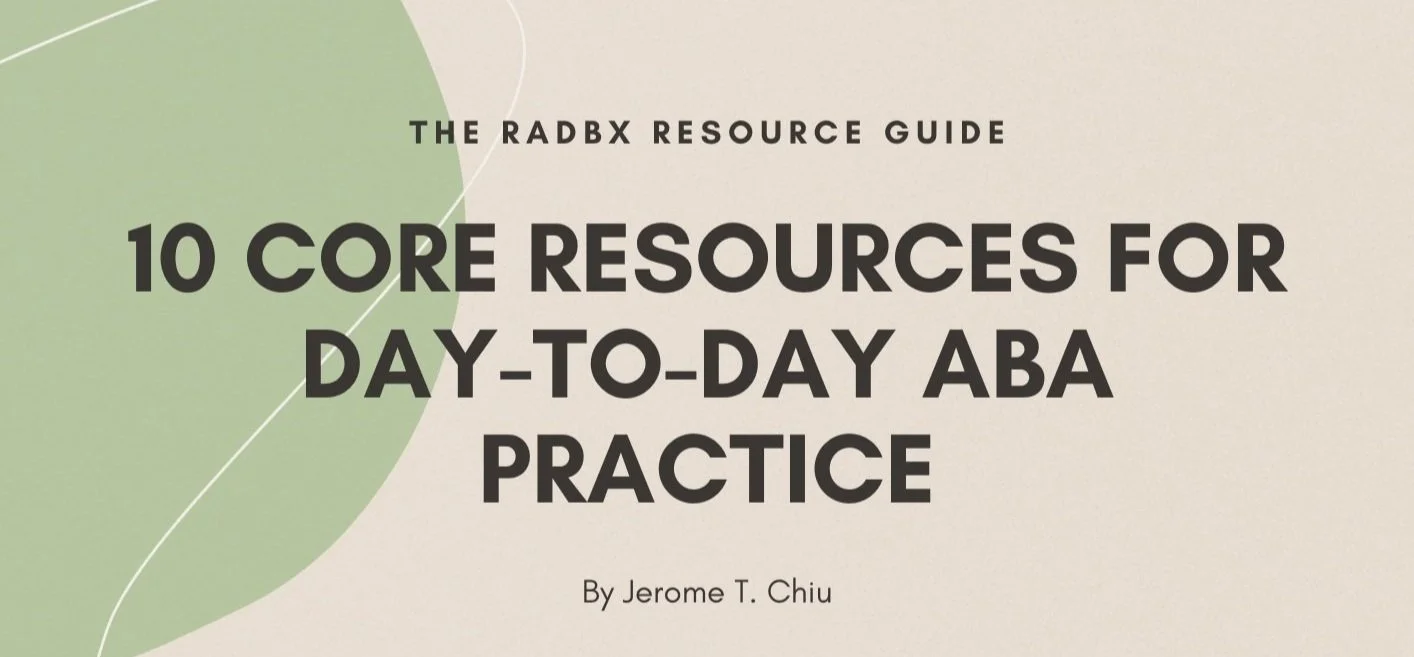FREE RESOURCES
10 Things Every ABA Owner Should Put Into Practice and The RadBx Resource Guide
are free and available to download as PDF Guides here.
10 Things Every ABA Owner Should Put Into Practice
By Jerome T. Chiu
It All Starts with Compliance.
Know the terms of your contracts. Identify the terms you’ve agreed to follow.
2. Identify the steps you must take to establish compliance.
3. Fold those steps into your daily practice.
4. Monitor compliance. Set up a system to easily identify when things go wrong.
5. Create a culture where compliance is valued. Listen to your staff. Encourage them to share concerns and ideas. Promote problem-solving.
Beyond Compliance
6. Establish company values. Defining these will help you rethink how you measure and monitor quality within your organization.
7. Get specific and be consistent. Embed those values into your practices across the organization.
8. Assess your organizational health. How will you determine if your organization is delivering quality care?
9. Decide how you will measure and monitor clinical performance.
10. Seek guidance. Find a trusted third party who can act as an advisor and hold you and your organization accountable to maintaining compliance, increasing access to care, and ensuring quality treatment.
Need More Info? Ready for Next Steps?
Take a look at our RadBx Resource Guide or schedule a consultation.
The RADBX RESOURCE GUIDE
Diving in and truly familiarizing yourself with these resources will help you as a practitioner. These can also improve the entire field of ABA. By understanding these resources, you can reshape your thinking around best practices in a way that raises standards for everyone.
1. For Session Notes
These standards contain the most concise and clear explanation about what needs to go into a session note and the components of a treatment plan. (Please note that the BHCOE is currently in the process of becoming Jade Health.)
2. Understanding Health Insurance Perspectives and What Payors Are Looking For
The CASP Guidelines contain a wealth of diverse information. They cover how to structure ABA organizations, how much supervision you need, what’s expected in a treatment plan, what are the models of treatment, and much more. Because the guidelines are so broad and expansive, people tend to read specific sections as needed. As such, they paint a large landscape and few people understand how the components are relevant to each other. Find the time to dig into this, front to back, and it will change your understanding of the context of our industry and the perspective of healthcare payors.
3. For Preventing Denials and Winning Appeals
The ABA Authorization & Appeals Playbook
This document contains anything and everything regarding denials and appeals. It’s the most comprehensive document that exists on this subject. If every clinician in the country read this and understood it, the number of appeals won by clinicians would increase drastically.
What is and isn’t a denial? How can you avoid accidentally self-sabotaging your appeal? What do you need to bring to the table when you fight a denial? The playbook provides the tools you need to ensure your patients can access services. For example, being meticulous about submission dates, holding payors accountable to responding on time, and authorizing temporary coverage so the patient can receive services during an appeal - just to name a few. This incredible resource was put together by a trustworthy team. It’s free to download. If you don’t already have it, please get it
4. To Gain Insight Into What “Ethics” Really Means In ABA
THE BACB Ethics Code for Behavior Analysts
Many use the Ethics Code as an index, with a predetermined result in mind. They often use this document to support their own point or perspective. Using the Ethics Code to improve your own behavior and the behavior of those around you is ideal. If you're using the Ethics Code as a threat to manipulate coworkers or staff, you're doing it wrong.
A better use of this document would be to understand how the relevant ethical codes relate to any issues you face. Apply those codes to the problem as a whole. Take the time to read and internalize this document. Then you can apply all the relevant points to any scenario you face. Use your judgment to determine how you can lead everyone’s behavior to be more ethical. This will result in better outcomes.
5. For Billing Codes
It’s not exclusive to ABA, but any time I’ve worked with someone who faced a billing issue I’ve used this book as a direct reference. While it’s true that it’s not free, it’s still incredibly handy and highly recommended.
6. Where To Ask Billing Questions
On a similar note, the ABA Coding Coalition is one of the best free resources available. You can ask any question and get guidance from an industry expert. These are real people you’re communicating with, not chatbots. They’ll send you resources and documents based on what you need. Anytime you’re tempted to ask a billing question via social media, go here instead.
7. When You Need Guidance on Insurance-Specific Issues
The Insurance Resource Center For Autism And Behavioral Health
This powerful non-profit helps people resolve insurance-based issues using industry knowledge and many of the resources above. They help with eligibility issues, gaps in coverage, disability waivers, and much more.
8. For Direct Support with Insurance Issues
This coalition has won many battles to support ABA providers against inappropriate payor actions. Acting as an advocate, they work with providers and advocate on their behalf to ensure a fair healthcare system.
9. Specific Guidance for Individual Providers
This organization supports individual providers and clinicians. They provide guidelines and statements that advance the industry’s understanding and ability to respond to a truly diverse scope of issues. Their resources support practitioners and inform consumers of best practice.
10. When you need to know if you’re doing it right
A Directory of State-Specific Licensure Boards
Every clinician should be fully aware of, and be in compliance with, all licensure requirements for the states in which they practice. If your state has a licensure board, please take the time to review and internalize the standards to which you are held.
Need more help?
jerome@radbx.com


